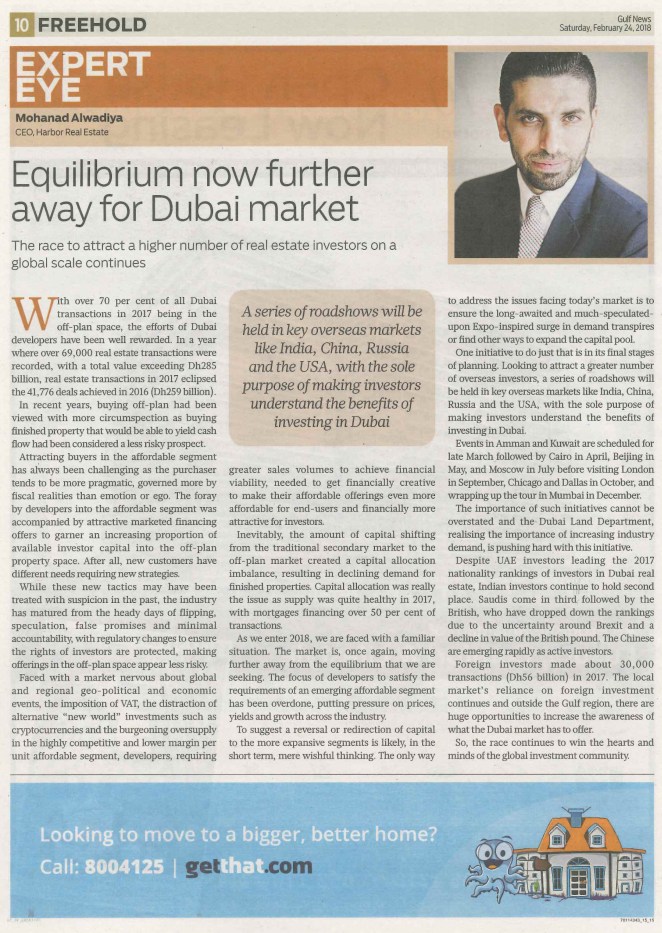With the Dubai property market undergoing a correction, does it make sense to invest or wait until the market is showing signs of picking up?
While the market is cooling a little, there are advantages to be gained from purchasing now. The market will pick up again as the next five years are expected to see strong economic growth, but picking the exact timing is difficult. Start your property search immediately as a property investment requires the same approach regardless of the state of the market. Know what you can afford. If you have the cash, pay for it outright, but don’t be afraid to take a mortgage. Think about location, infrastructure, construction quality, developer reputation and building amenities. Consider the effectivity of the owners association, service charges and quality of maintenance services. Be purposeful, persistent, patient and pragmatic in your approach to make a sound investment decision.
There seems to be a lot of press and activity regarding the Expo 2020. How can I, as a landlord of four apartments, capitalise on any new opportunities?
Seek professional advice on to how to manage your portfolio. Many landlords across Dubai are bound to miss out on the revenue generating opportunities that the Expo will bring because of poor or non-existent planning.
A competent property manager will provide you with the best opportunity to maximise your financial gains. Do not make the mistake of leaving your planning too late. Know the current and likely future market conditions and events, risk factors that may enable or inhibit revenue growth, inflation and cost increases and a complete comprehension of financial modeling and the ever-developing area of industry policy and regulation. Depending on the size and complexity of your portfolio, make a five-year plan which covers pricing, cost management and maintenance schedules and several other considerations.
I have 14 apartments which are becoming too large to manage. I am considering hiring a property manager. What type of fees can I expect to pay?
It will vary by provider. It may be between 3% and 6% of the rental receipts; some will have an administrative fee. Understand what you expect from your property manager as the depth and breadth of their services vary greatly. You can negotiate a fee structure based on your actual requirements. Ask for referrals and make sure you follow up with some existing clients to check their efficiency and professionalism. A competent property manager will provide an assessment, strategy and activity plan designed to harness the financial potential of your property. You should have a rolling five-year activity plan which covers pricing, marketing and tenant management among others. A competent property manager will also provide you with review schedules regular financial reporting and many more.
With many new projects and off-plan opportunities, I am nervous about the quality of end products. Can we expect an improvement in quality?
During the global financial crisis, many developers realised that properties of poor quality were dealt the harshest of value declines. As a result, many developers did not survive. Having said that, the old caveat of “buyer beware” still applies. Deal with a reputable developer. Ask around or seek professional guidance. Ask what proactive measures are taken to ensure the end product has been built to an acceptable standard. Warranties and any quality assurance policies should be discussed in detail and have the sales and purchase agreement reviewed by a professional. Engage an expert to inspect (snag) your property and report any legitimate issues to the developer for rectification. Remember, once you have taken ownership of the apartment, the developer is still obliged to fix any issues that may arise during the full 12 months following the transfer of ownership.
Now that the market has corrected, there are many good opportunities in completed assets. Given the rising value of finished properties, are there advantages of buying off-plan now?
Purchasing an off-plan property. can provide you with superior capital gains by the time of completion, provided you are buying at a discount to today’s finished inventory and the market is expected to strengthen up to the completion date for the particular property that you are considering. This, of course, will depend on an estimation of economic growth, population expansion, the number of competing projects in the pipeline and the eventual industry inventory position.
Be smart about the product that you buy and try to avail yourself of a payment plan.
Look for certain property types complete with amenities and facilities in locations you believe will be keenly sought in the future. Do not assume that all property types in all locations will improve their values homogeneously. No market works this way. Also check the latest Metro route planning.
Deal with reputable developers only and check the status of the escrow account of the development. Escrow accounts were introduced under Law No. 8 whereby all property developers in Dubai must be registered with RERA and hold an escrow account which protects the funds of the buyers and ensures safety of the purchase.









